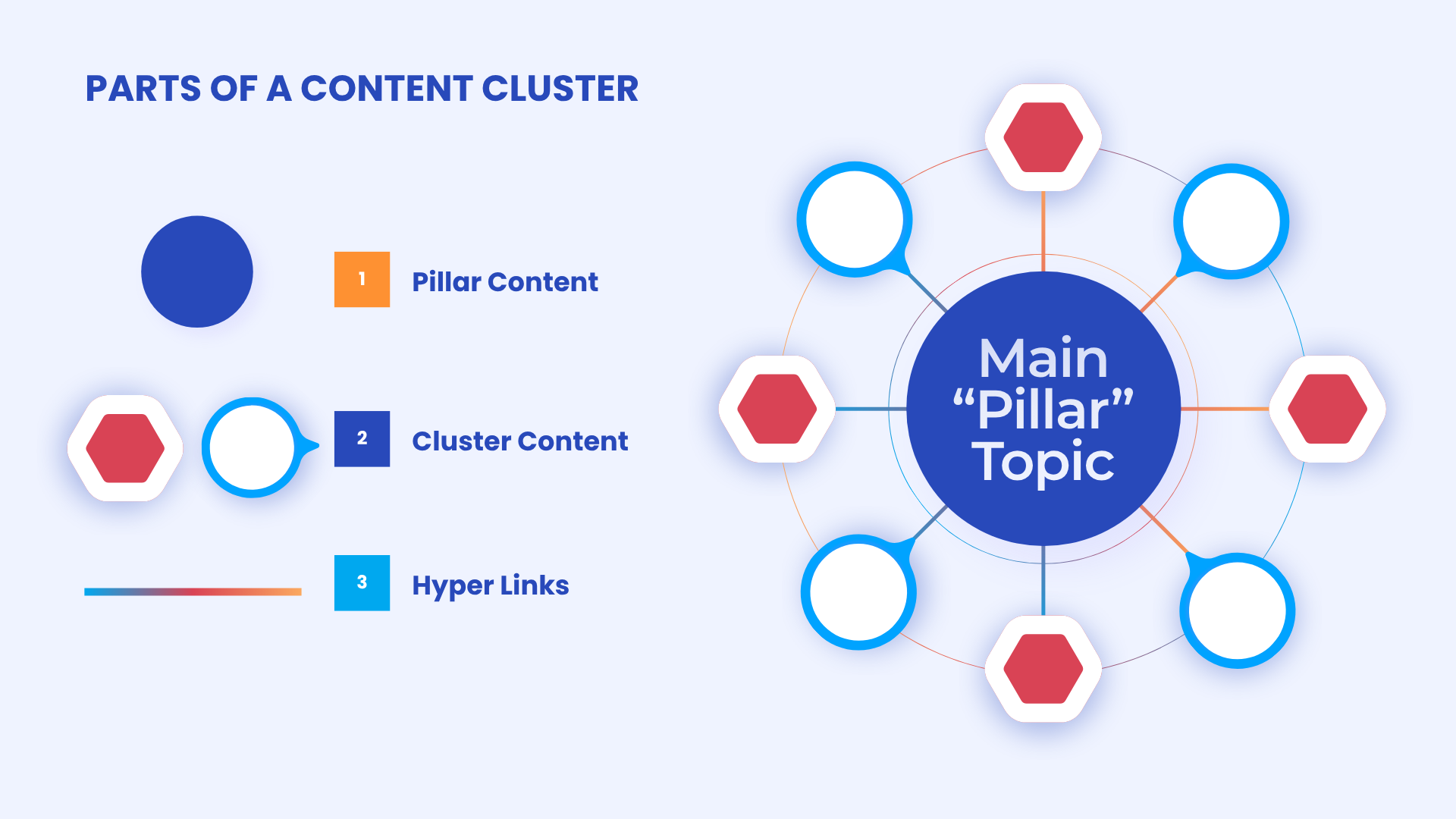Topical authority matters.
But don’t take our word for it: The Google algorithm leaks confirm that topical authority matters for rankings.
When you consistently publish smart, focused content on a specific subject, search engines start treating you like the expert in the room.
Here’s why topical authority in SEO matters and how you can start building it.
TL;DR
- Topical authority is your competitive edge, proving you know your domain better than anyone.
- A focused content system wins: pillars, clusters, internal links, and high-effort insights.
- Web3 brands depend on it because expertise builds trust, shortens sales cycles, and boosts rankings.
What Is Topical Authority?
Topical authority is your brand’s proven expertise on a topic. It comes from consistent, high-quality content that demonstrates how well you know a subject.
To search engines, topical authority proves you understand the space you operate in. It creates a ripple effect:
- Algorithms start ranking you higher.
- Readers trust you faster.
- Other sites start citing you.
This means your content connects on all the right levels and becomes your most valuable asset.

Topical Authority Matters: The Google Algorithm Leaks Showed Us That!
If you ever needed proof of what drives search visibility, Google’s algorithm leaks handed it to us on a silver platter. Two systems stood out: Authority and Relevance.
Together, they decide what content ranks.
Deconstructing the Authority system (Q*)
Q* was one of the biggest surprises from the leak. It’s a quality scoring system Google never publicly acknowledged.
Researchers and SEOs combed through the leaked API documentation and found references to Q*-style quality checks tied directly to trust, content depth, and site cleanliness.
Here’s what it looks at:
- Trust: Are you credible? Do other reputable sites reference you?
- Site quality: Is your content polished, original, and not stuffed with filler?
- Content effort: Did you actually work to create something valuable, or did you slap together a summary?
- predictedDefaultNsr: Google’s estimate of how your content will satisfy users without them bouncing.
- clutterScore: The noise-to-value ratio on your site; too much fluff, and you’re out.
Deconstructing the Relevance system (T*)
T* was another buried gem from the leak. It’s Google’s internal engine for measuring how well a page matches what the user actually wants. Q* decides if you’re credible; T* decides if you’re the right answer right now.
Here’s what T* and the Relevance layer focus on:
- Query-dependent relevance: How tightly your content matches search intent.
- User behavior signals: Metrics like goodClicks (clicks that lead to meaningful engagement) and lastLongestClicks (page users stick with because it satisfied the query).
- On-page clarity: Content that’s structured, scannable, and focused on the topic.
Relevance is where topical authority pays off. If you consistently publish content around a tight theme, T* sees a pattern.
Why the siteFocusScore & siteRadius matter
The leaks confirmed what SEOs suspected for years: Google rewards websites that stay in their lane.
- siteFocusScore measures how tightly your content sticks to a core theme.
- siteRadius checks how far you drift from your main topic.
If your site talks about blockchain one day, pet grooming the next, and air fryers on Sundays, your siteRadius balloons and your FocusScore tanks.
Don’t be the “everything” blog.
Topical authority compounds like interest. The more focused, useful content you publish, the harder it is for competitors to catch up.
How to Build Topical Authority: A Step-by-Step Guide
Building topical authority means showing you know your subject better than anyone else. Here’s how to build topical authority for a website that algorithms recognize as expert-level:
Define your site’s core topic
Choose the one subject your brand wants to own. Not five, not “whatever’s trending,” just one.
Your content strategy should revolve around this core theme: tokenomics, cybersecurity, L2 infrastructure, or whatever your specialty is.
Then choose subtopics that naturally fit under the bigger umbrella. Doing this keeps your content focused and avoids “topic sprawl.”
Create a pillar-cluster content strategy
A great topical strategy starts with a pillar page: a deep, comprehensive guide that covers your core topic end-to-end. Think of this as your “master resource”: it’s the page every other page points back to.

Around that pillar, build clusters of shorter, focused articles that dive into specific questions, subtopics, or keywords.
This step serves two purposes:
- You become an organized knowledge base instead of a loose pile of blog posts.
- It teaches algorithms how your content relates to one another.
Optimize for content effort signals
Google’s leak made one thing clear: the algorithm rewards content that looks like it took real work. High-effort content signals depth, originality, and actual expertise. These are exactly what topical authority is built on.
Here’s how to do this:
- Add original insights, such as founder commentary, data, or firsthand experience.
- Show your work with screenshots, diagrams, or examples.
- Go deeper than summaries and give real examples.
- Answer real questions fully that go beyond the headline.
- Avoid filler to provide real value.
Demonstrate semantic depth and E-E-A-T

Semantic depth is Google’s way of checking whether you understand the topic. Combined with E-E-A-T (experience, expertise, authority, and trust) signals, you demonstrate you’re an expert worth ranking.
To do this:
- Use entity-rich language, like people, frameworks, or technologies.
- Refer to connected concepts.
- Map the relationships between ideas.
- Add author bios with credentials.
- Cite reputable sources.
- Link to recognized research.
- Include transparent disclaimers when needed.
Optimize for user experience & AI-search signals
Clean layouts, fast load times, and easy-to-use navigation help users stay longer and bounce less. This feeds your goodClicks and lastLongestClicks metrics.
For AI-search optimization, structure your content with scannable headers, crisp summaries, and clear answers. Generative engines love clarity.
Build & maintain topical coherence
Topical coherence means staying in your lane. If your product is a Bitcoin Layer 2, for example, focus on Bitcoin L2-related topics. Random, off-topic articles can weaken siteRadius, which dilutes your authority.
To stay on track, audit your content regularly. Remove or rework outliers and find opportunities for better internal linking. The more unified your content network, the harder it is for competitors to outrank you.
Why Topical Authority is Non-Negotiable for Web3 Brands
For Web3 brands, topical authority acts as a revenue lever. When people trust your knowledge, they trust your product.
And when algorithms recognize your authority, they put you in front of people who matter.
Here’s how topical authority can drive better business results:
- Builds the B2B moat: Competitors can clone a landing page or rewrite a blog post, but they can’t duplicate a tightly connected ecosystem of research, insights, original data, and expertise.
- Shortens the sales cycle: Your content answers every stage of the buyer journey, from “What is staking?” to “X vs. Y L2” to “Best custody solutions.” Prospects convert faster because you’ve already earned their trust.
- Boosts all your rankings: When Google and AI engines recognize your authority, new content ranks faster and more reliably. Think of it as the SEO “halo effect.”
- Future-proofs your SEO: AI search engines like Google AI Mode and Perplexity look for deep, consistent, authoritative sources to turn them into answers. Strong topical authority ensures you become that source.
Need Help Building Topical Authority in Web3?
When you consistently publish high-effort, interconnected content around a clear core topic, algorithms recognize you as the expert. That means search engines will cite your content, which puts your brand in front of people.
If you’re ready to turn your expertise into topical authority, we’re here to build your strategy. Reach out to our team today.
FAQs
What’s the difference between topical authority and domain authority?
Topical authority measures how deeply your brand understands and covers a specific subject. Domain authority measures your overall site strength based on backlinks and trust signals. Topical authority often matters more because algorithms reward expertise, not just link equity.
How long does it take to build topical authority?
Most brands start seeing traction within 60-90 days of consistent, focused publishing. Real topical authority usually takes 4-6 months, sometimes longer. The key is consistency: stay on topic, publish often, and reinforce your expertise with strong internal linking.
How is internal linking used to build topical authority?
Internal links help search engines understand how your content fits together. It provides a clear map of your expertise. When you link related articles, Google sees a well-organized topic cluster instead of isolated posts. This boosts relevance signals that treat your site as an authority on that subject.
Can small sites build topical authority without backlinks?
Yes. Topical authority is one of the few SEO levers where small, niche sites can outperform big players. If your content is focused, well-structured, and genuinely useful, search engines can rank you highly even with minimal backlinks. However, if you really want to compete in Web3, you will need an active link-building campaign, as the largest brands in this space spend tens of thousands of dollars just on growing their domain authority.
How do I measure topical authority?
Look at whether your content cluster starts ranking higher across related keywords and if you’re capturing more impressions for queries within your niche. Track how many of your pages appear in AI-generated summaries, featured snippets, or People Also Ask results. Monitor engagement metrics like time on page and scroll depth to see if users treat your content as valuable. When you see consistent lifts across an entire topic, not just individual posts, you’re building real topical authority.




